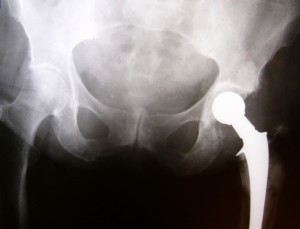What’s the difference between a traditional hip replacement and a minimally invasive muscle sparing hip replacement (MS-AL)? Minimally invasive hip replacement can be a lot easier! Find out more in this blog post by Adam J. Rana, MD, Attending Orthopedic Surgeon, Maine Medical Partners.
The traditional surgical approach uses a single, long incision to view and access the hip joint. This involves cutting muscle/tendons to access the joint and then repairing them at the end of surgery. An alternative to this approach is a minimally invasive muscle sparing procedure in which a shorter incision is made and no cutting of muscles is involved.
A main reason why I use the MS-AL approach when performing hip replacements is that it reduces pain and speeds a patient’s recovery. As a result of less pain, patients do not require as strong pain medications as with the traditional approach. This results in fewer cases of nausea, delirium and constipation which are side effects of strong pain medications, such as narcotics.
 Another benefit of the MS-AL approach is that it provides a more stable hip joint with a lower incidence of dislocation. Patients do not have hip precautions following surgery. Hip precautions, like not sleeping on your side or crossing your legs, are important after traditional hip replacement for up to 3 months after surgery and can be a source of patient anxiety.
Another benefit of the MS-AL approach is that it provides a more stable hip joint with a lower incidence of dislocation. Patients do not have hip precautions following surgery. Hip precautions, like not sleeping on your side or crossing your legs, are important after traditional hip replacement for up to 3 months after surgery and can be a source of patient anxiety.
The final advantage I see with this approach is that it is universal, meaning I can perform it on almost all patients that come to my office.
Minimally invasive hip replacement has a great track record
The experience at the Joint Replacement Center at Maine Medical Center regarding the MS-AL approach has been very successful. In 2014 my partners (Dr. George Babikian and Dr. Brian McGrory) and I performed 742 MS-AL hip replacements, up 25% from 2013. Our length of stay following the surgery was 1.3 days which is significantly less than the national average of greater than 3 days. 92% of our patients were discharged home following the procedure which places us as one of the top groups in the country for shortest length of stay and getting patients home where they can recover in a familiar environment.
A study conducted by CMS (Center for Medicare and Medicaid Services) reinforces the fact that these patients are sent home in a safe manner and are less likely to return to the hospital with a complication or for readmission. The CMS study (which spanned from 2009 to 2011) looked at all hip and knee replacement centers in the United States and found MMC to be in the top 1% nationwide for lowest complications and 30 day readmissions.
A large amount of work has been put into developing our MS-AL joint replacement program and there are a number of keys to our success.
- assembling an excellent team that sets the highest standards to give our patients the best chance of a successful outcome
- Pre-operative education. We prepare each patient for what to expect before and after surgery both verbally and with written materials. This information is reinforced by our office staff and at a joint replacement class which is held on a weekly basis and consists of nurses, therapists, discharge planners and surgeons.
- four dedicated operating rooms at MMC devoted to our group with an operating team that knows every detail of the surgery. This is complemented by nursing staff and therapists that work with our patients a few hours after surgery to get them up and moving with a walker.
- 92% of our patients go home the day after surgery and are followed up at routine intervals.
I have been a champion within the group of collecting and reporting out on patient reported outcomes which follows how our patients do functionally before and after surgery. I hope to discuss some of these outcome measures during the next blog.
I am happy to answer any questions my readers may have regarding this approach for hip replacement. Please feel free to write me at ranaa@mmc.org. Adam J. Rana, MD, Attending Orthopedic Surgeon, Maine Medical Partners Division of Joint Replacements, and Assistant Clinical Professor at the Tufts School of Medicine .(207) 781-1551.